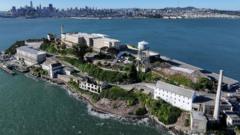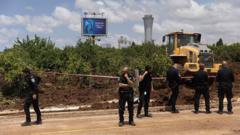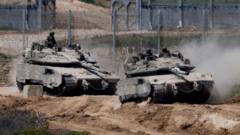Following a ballistic missile attack by Houthi militants that landed close to Israel's Ben-Gurion International Airport, Israeli forces launched airstrikes in Yemen, targeting vital Houthi infrastructure. This retaliatory action is part of an ongoing confrontation marked by escalating violence and geopolitical complexities.
Escalating Hostilities: Israel Strikes Yemen Following Houthi Missile Attack

Escalating Hostilities: Israel Strikes Yemen Following Houthi Missile Attack
Tensions escalate as Israeli fighter jets bomb Houthi targets in retaliation for missile strike near Tel Aviv airport.
In the latest chapter of Middle Eastern tensions, Israeli fighter jets undertook a significant operation, traveling over 1,000 miles to bomb targets in the port city of Hudaydah, Yemen, on Monday. This military action followed a Houthi missile attack that had successfully evaded Israel’s extensive aerial defense systems, landing perilously close to Ben-Gurion International Airport, Israel’s primary international gateway.
The missile strike, which occurred on Sunday, did not result in any immediate casualties, but it quickly prompted Israeli leaders to announce a vigorous response. This exchange is the latest in a series of tit-for-tat skirmishes involving the Iranian-backed Houthi militia, which has launched numerous missile and drone strikes against Israel. The group claims these attacks are in solidarity with Palestinians amidst ongoing conflicts in Gaza.
Since the beginning of this prolonged engagement, Israel, supported by the U.S. and U.K., has conducted a series of airstrikes aimed at deterring Houthi aggression. The Houthis, meanwhile, have also targeted commercial and military vessels in the Red Sea, ostensibly to obstruct Israeli shipping routes, despite most of these ships having unclear connections to Israel.
Israeli military actions on Monday focused on significant assets linked to the Houthi regime, including the vital port of Hudaydah, a crucial entry point for food and humanitarian aid into northern Yemen, a region plagued by severe deprivation where over 20 million people reside. An additional target was a concrete factory southeast of the port, further intensifying the conflict's impact on the humanitarian situation in Yemen.
Despite extensive military operations, neither Israel nor the Houthis have managed to achieve their strategic objectives fully. The Houthis have expressed their determination to persist with missile fire towards Israel until the ongoing counteroffensives against Hamas in Gaza conclude, an operation that Israel seems poised to broaden.
Military analysts have conveyed concerns that the means available to effectively combat the remote but determined Houthi presence are limited, despite backing from international allies. U.S. military offensives against the Houthis have also increased under President Trump's administration. The U.S. has intensified sanctions and designated the militia a "foreign terrorist organization," reflecting growing concerns over the situation.
While the U.S. has kept much of its operations against the Houthis under wraps, local reports from Houthi officials claim substantial civilian casualties resulting from American airstrikes. One such operation in April reportedly killed at least 74 people at a key fuel depot in Hudaydah, raising alarms about the conflict's collateral damage.
As the conflict rages on, the prospects for peace and de-escalation appear increasingly grim, leaving millions in Yemen vulnerable amid ongoing hostilities that span regions and conflict lines. Aaron Boxerman continues to report on these critical issues from Jerusalem, providing insights into the complex dynamics shaping the region’s future.
The missile strike, which occurred on Sunday, did not result in any immediate casualties, but it quickly prompted Israeli leaders to announce a vigorous response. This exchange is the latest in a series of tit-for-tat skirmishes involving the Iranian-backed Houthi militia, which has launched numerous missile and drone strikes against Israel. The group claims these attacks are in solidarity with Palestinians amidst ongoing conflicts in Gaza.
Since the beginning of this prolonged engagement, Israel, supported by the U.S. and U.K., has conducted a series of airstrikes aimed at deterring Houthi aggression. The Houthis, meanwhile, have also targeted commercial and military vessels in the Red Sea, ostensibly to obstruct Israeli shipping routes, despite most of these ships having unclear connections to Israel.
Israeli military actions on Monday focused on significant assets linked to the Houthi regime, including the vital port of Hudaydah, a crucial entry point for food and humanitarian aid into northern Yemen, a region plagued by severe deprivation where over 20 million people reside. An additional target was a concrete factory southeast of the port, further intensifying the conflict's impact on the humanitarian situation in Yemen.
Despite extensive military operations, neither Israel nor the Houthis have managed to achieve their strategic objectives fully. The Houthis have expressed their determination to persist with missile fire towards Israel until the ongoing counteroffensives against Hamas in Gaza conclude, an operation that Israel seems poised to broaden.
Military analysts have conveyed concerns that the means available to effectively combat the remote but determined Houthi presence are limited, despite backing from international allies. U.S. military offensives against the Houthis have also increased under President Trump's administration. The U.S. has intensified sanctions and designated the militia a "foreign terrorist organization," reflecting growing concerns over the situation.
While the U.S. has kept much of its operations against the Houthis under wraps, local reports from Houthi officials claim substantial civilian casualties resulting from American airstrikes. One such operation in April reportedly killed at least 74 people at a key fuel depot in Hudaydah, raising alarms about the conflict's collateral damage.
As the conflict rages on, the prospects for peace and de-escalation appear increasingly grim, leaving millions in Yemen vulnerable amid ongoing hostilities that span regions and conflict lines. Aaron Boxerman continues to report on these critical issues from Jerusalem, providing insights into the complex dynamics shaping the region’s future.




















